2022年中考英语二轮专题复习课件:专题六 介词和介词短语(56张ppt)
文档属性
| 名称 | 2022年中考英语二轮专题复习课件:专题六 介词和介词短语(56张ppt) |  | |
| 格式 | zip | ||
| 文件大小 | 4.5MB | ||
| 资源类型 | 教案 | ||
| 版本资源 | 人教新目标(Go for it)版 | ||
| 科目 | 英语 | ||
| 更新时间 | 2022-03-09 22:42:32 | ||
图片预览

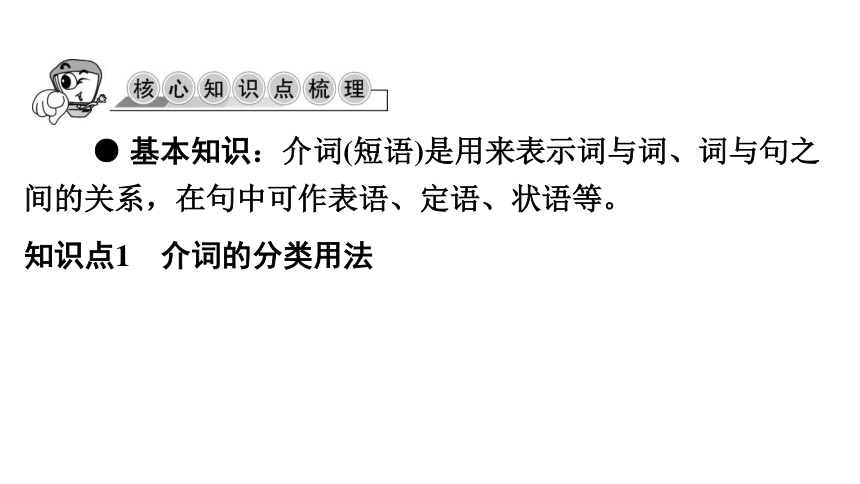
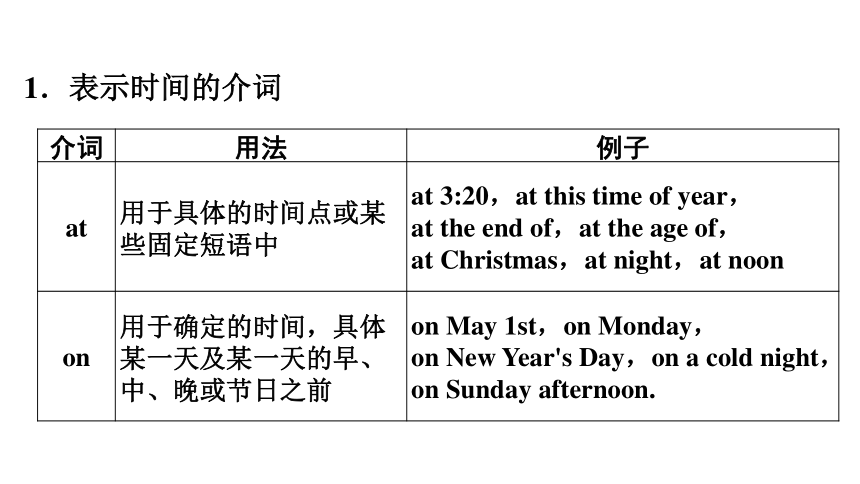
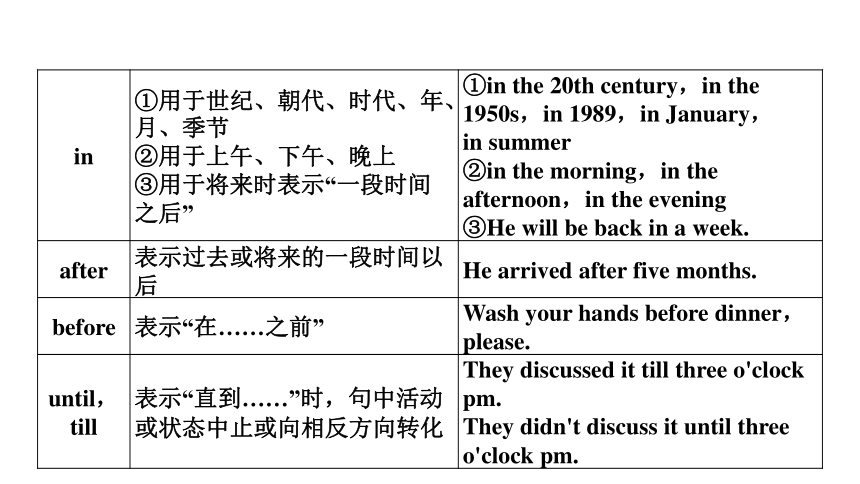

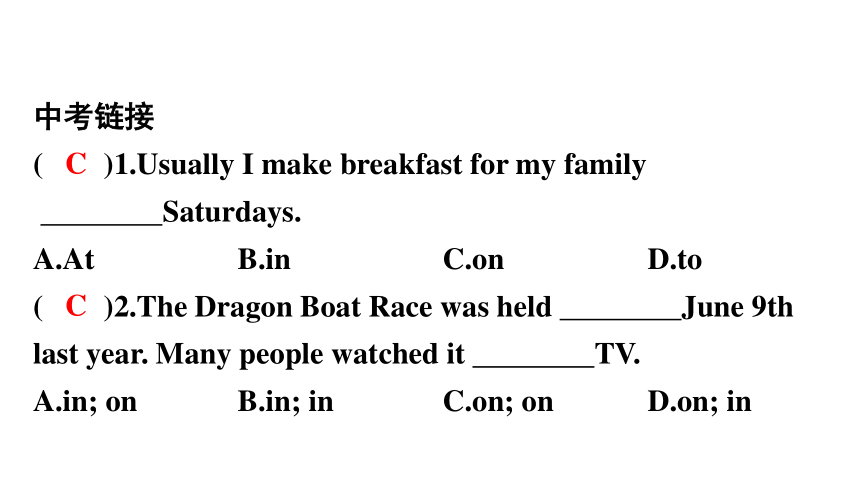

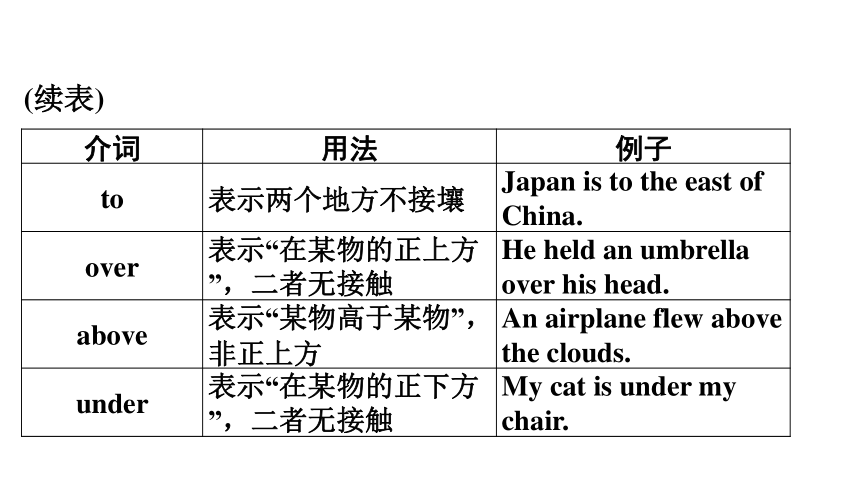
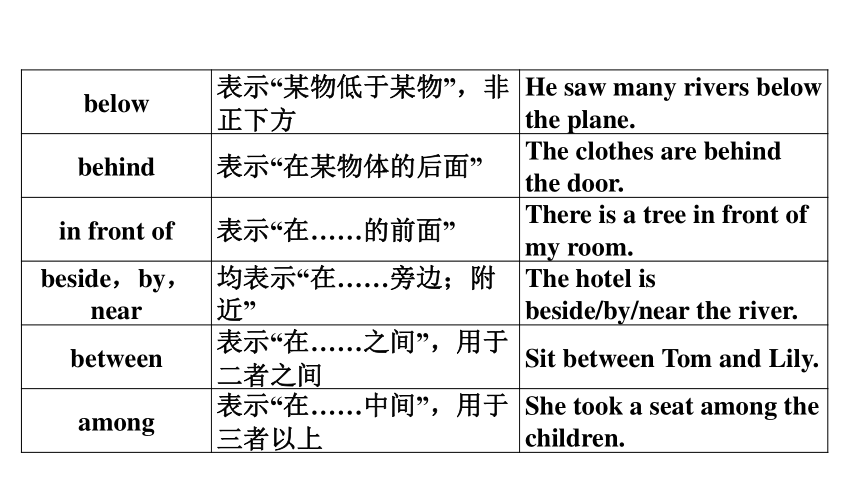
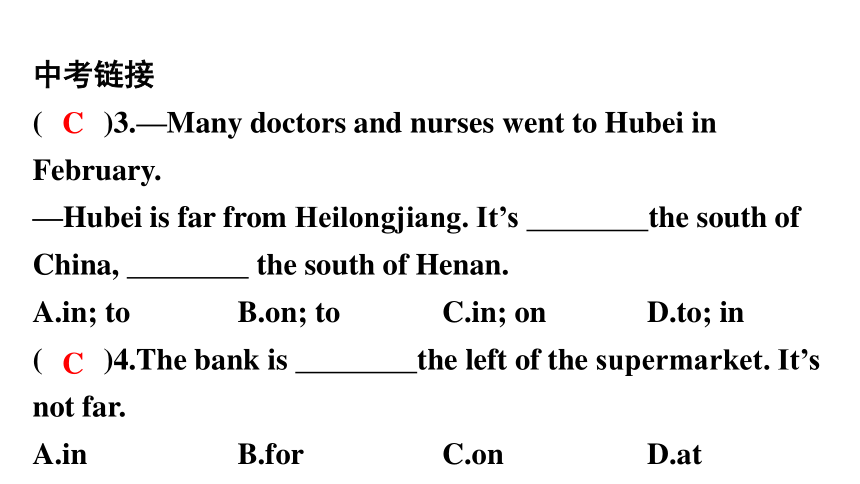
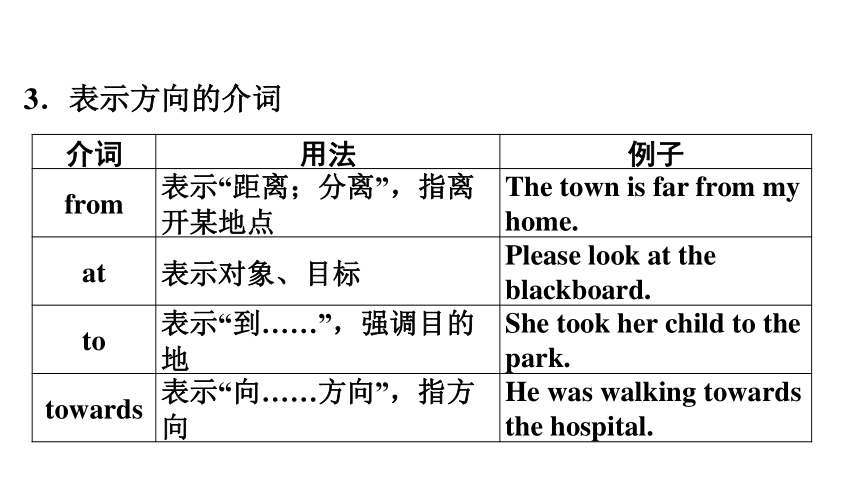
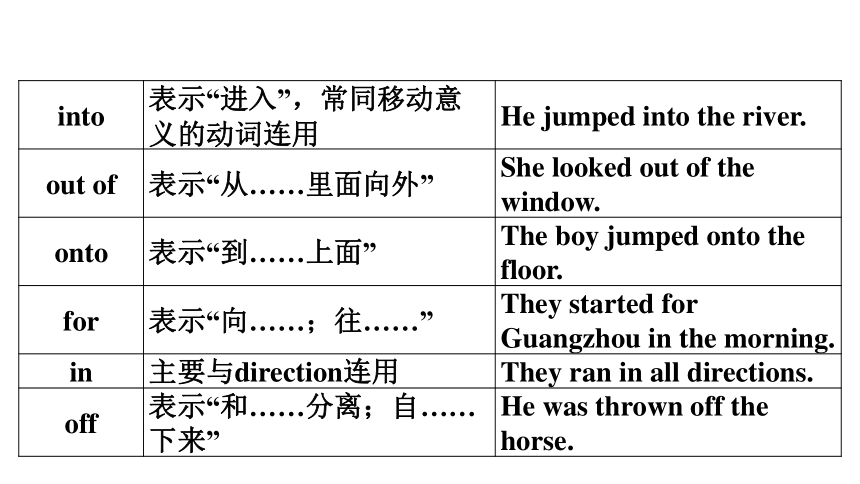
文档简介
(共56张PPT)
专题六 介词和介词短语
● 基本知识:介词(短语)是用来表示词与词、词与句之间的关系,在句中可作表语、定语、状语等。
知识点1 介词的分类用法
1.表示时间的介词
介词 用法 例子
at 用于具体的时间点或某些固定短语中 at 3:20,at this time of year, at the end of,at the age of, at Christmas,at night,at noon
on 用于确定的时间,具体某一天及某一天的早、中、晚或节日之前 on May 1st,on Monday, on New Year's Day,on a cold night,on Sunday afternoon.
in ①用于世纪、朝代、时代、年、月、季节 ②用于上午、下午、晚上 ③用于将来时表示“一段时间之后” ①in the 20th century,in the 1950s,in 1989,in January, in summer
②in the morning,in the afternoon,in the evening
③He will be back in a week.
after 表示过去或将来的一段时间以后 He arrived after five months.
before 表示“在……之前” Wash your hands before dinner,please.
until,till 表示“直到……”时,句中活动或状态中止或向相反方向转化 They discussed it till three o'clock pm.
They didn't discuss it until three o'clock pm.
by 表示句中的活动或状态在“by的时间”时已经完成 The train will arrive by six o'clock.
from 说明什么时候开始 He studied the piano from the age of three.
since 表示某动作或情况持续至说话时刻 Li has worked in this factory since 1970.
for 说明某动作或情况持续多久 Li has worked in this factory for over 30 years.
during 表示“在……期间” Lucy had a good time during her summer holiday.
注:last,next,this,that,some,every 等词之前一律不用介词。如:We meet every day.
中考链接
( )1.Usually I make breakfast for my family
Saturdays.
A.At B.in C.on D.to
( )2.The Dragon Boat Race was held June 9th last year. Many people watched it TV.
A.in; on B.in; in C.on; on D.on; in
C
C
2.表示地点方位的介词
介词 用法 例子
at 表示“在......处”,指较小的地点 He isn't at home now.
in 表示“在......内部;在......里面” Shanghai is in the east of China.
on 表示“在某物的上面”,二者互相接触 My books are on that table.
表示两个地方接壤 Hunan is on the north of Guangdong.
(续表)
介词 用法 例子
to 表示两个地方不接壤 Japan is to the east of China.
over 表示“在某物的正上方”,二者无接触 He held an umbrella over his head.
above 表示“某物高于某物”,非正上方 An airplane flew above the clouds.
under 表示“在某物的正下方”,二者无接触 My cat is under my chair.
below 表示“某物低于某物”,非正下方 He saw many rivers below the plane.
behind 表示“在某物体的后面” The clothes are behind the door.
in front of 表示“在……的前面” There is a tree in front of my room.
beside,by,near 均表示“在……旁边;附近” The hotel is beside/by/near the river.
between 表示“在……之间”,用于二者之间 Sit between Tom and Lily.
among 表示“在……中间”,用于三者以上 She took a seat among the children.
中考链接
( )3.—Many doctors and nurses went to Hubei in February.
—Hubei is far from Heilongjiang. It’s the south of China, the south of Henan.
A.in; to B.on; to C.in; on D.to; in
( )4.The bank is the left of the supermarket. It’s not far.
A.in B.for C.on D.at
C
C
3.表示方向的介词
介词 用法 例子
from 表示“距离;分离”,指离开某地点 The town is far from my home.
at 表示对象、目标 Please look at the blackboard.
to 表示“到……”,强调目的地 She took her child to the park.
towards 表示“向……方向”,指方向 He was walking towards the hospital.
into 表示“进入”,常同移动意义的动词连用 He jumped into the river.
out of 表示“从……里面向外” She looked out of the window.
onto 表示“到……上面” The boy jumped onto the floor.
for 表示“向……;往……” They started for Guangzhou in the morning.
in 主要与direction连用 They ran in all directions.
off 表示“和……分离;自……下来” He was thrown off the horse.
along 表示“沿着” They take a walk along the river.
across 表示“横过”,指横穿过一平面 He walked across the road.
through 表示“穿过”,指从某个空间穿过 A river goes through the city.
past 表示“路过;经过” Tell him the news when you go past his house.
(a)round 表示“在……周围;环绕” He traveled around/round the world last year.
about 表示“各处;到处” He is walking about the town.
中考链接
( )5.—Jack,can you swim the river
—I don’t think I can. It’s too wide for me.
A.over B.across C.through D.along
( )6.We all know that the earth moves the sun.
A.Through B.along C.past D.around
D
B
4.表示方式、手段或工具的介词
介词 用法 例子
by 用,由,被,乘坐 It was written by Lao She.
in 用(语言) Please tell the story in English.
with 用(具体材料),手段;用(手/脚/耳/眼) We see with our eyes and walk with our feet.
over 通过(收音机) I get news over the radio.
through 通过…… I finished the essay through her help.
on ① 骑(车);徒(步) ② 通过(收音机/电视机) ①I always go to school on my bike.
②Now most people don't get news on the radio.
中考链接
( )7.The children here improve their English__________ listening and speaking every day.
A.on B.through C.with D.by
( )8.Class, let’s see who can spell most words___________ these letters.
A.at B.into C.on D.with
D
D
5.表示原因的介词
介词 用法 例子
at 常表示某种表情的起因 You don't look very surprised at the good news.
for 表示原因 The West Lake is well known for its scenery.
because of 表示引起结果的直接原因 The match was put off because of the rain.
with 多表示某种心理或心理状况的原因 His face went red with anger.
from 常接抽象名词表示自然或间接原因 He suffered from a bad cold.
of 多用于自身的原因,如死因、病因等 His father died of cancer.
中考链接
( )9.His hands moved greatly anger.
A.with B.for C.at D.from
( )10.Wild animals are our friends. We shouldn’t kill them __________food or clothing.
A.in B.with C.about D.for
D
A
6.其他介词
介词 用法 例子
about 意为“关于……” They are excited talking about the trip.
on 意为“关于;有关……” Tom gave a talk on the history of America.
except 意为“除……之外(不再有)” We all passed the exam except Tom.
(续表)
介词 用法 例子
besides 意为“除……之外(还有)” I have another pen besides this one.
for 对于/就……而言(多表示客观情况) It's too hard for me to do the work.
to 意为“对……而言”(多表示主观态度) Our teacher is very kind to us.
of ……的,有关……,对于/就……而言 It's very nice of you to help me.
in 意为“在……(方面)” He does very well in English.
like 表示(外表)“像……一样” The little girl looks like her father.
as 表示“作为……”,表示事实 He treats me as a child.
instead of 表示“代替,而不是” Instead of lending a hand,he laughed at us.
against 表示“反对,依靠” He sold his house though it was against his will.
in 表示“穿着……衣服/颜色” He is dressed in black.
with 表示“与……一起,有/带着/长着……” The girl with golden hair looks beautiful.
without 表示“没有,无,不”等 She walked away from the house without a word.
中考链接
( )11.All of us helped to clean up the old people’s home
Eric. He had a bad cold.
A.besides B.against C.except D.with
( )12.Today some newly-produced mobile phones can take pictures a camera.
A.with B.like C.for D.of
B
C
知识点2 常见的介词短语
形容词+介词(详见《晨读手册》短语表) careful about关心,关注 famous for因……闻名 ready for为……做好准备 different from与……不同 interested in对……感兴趣
angry with生……的气
介词+名词 at work/home/school上班/家/上学 at night在晚上 at the end of在……末梢/结束时 at the foot of在……脚下 at the same time同时 at the age of在……岁数时 at weekends/the weekend在周末 by the end of到……末为止 by the way顺便说 with the help of在……的帮助下 on foot步行 to one’s surprise令……惊讶的是 in this way用这种办法 in fact事实上 in front of在……前面 on one’s way to在去……的路上 in a hurry匆忙的
for example例如
at breakfast在吃早餐
in the end终于
at last最后;终于
in trouble处于困难中
in danger处于危险中
on the phone用电话
动词+介词 arrive at/in到达 look after照料 look for寻找 look over检查 get to到达 get on/off上/下车 point at指 smile at朝……微笑 laugh at朝……大笑 knock at/on敲 think of 想起;认为 think about考虑 wait for等待 ask for请求 pay for支付 take pride in为……而自豪 look at看 listen to听 agree with同意
hear from收到……来信
come from来自
talk about谈论
talk to/with与……交谈
worry about担心
do/deal with处理
prefer…to…宁可;更喜欢
prepare for为……做准备
中考链接
( )13.—I think washing hands every day is good________ our health.
—Yes, I agree you!
A.to; to B.for; with C.with ;to D.at; with
B
( )14.—In order to win the new Pneumonia Resistance War, many heroes lost their lives.
—Yeah. China is quite an unusual country. I take pride_____ my motherland.
A.of B.for C.with D.in
D
一、实战演练
( )1.—When is Lang Lang’s concert
—It’s three o’clock the afternoon of December 18th.
A.at ; in B.at; on C.on; in D.in; on
B
( )2.—I like the weather in Kunming. It’s warm all year long.
—Yes. And the temperature stays zero all the time.
A.At B.below C.around D.above
D
( )3.—You’ve been here a month. Don’t you miss your parents
—Yes, I plan to come back home a month.
A.for; in B.in; in C.for; after D.after; after
( )4.Xiaogan is well known the culture of “Xiao”.
A.in B.at C.for D.on
C
A
( )5.—How are you going to the train station to meet your aunt
—I’m going there my car.
A.By B.in C.to D.on
( )6.My mother says my friend is similar me, but I think she is different me.
A.as;from B.to;from C.to;to D.as;to
B
B
( )7.Jenny’s uncle is a scientist. She is proud him.
A.from B.at C.in D.of
( )8.—Who is your favourite singer, Mike
—TF Boys. They are very boys and girls.
A.proud of B.popular with
C.strict with D.worried about
B
D
( )9.—Excuse me, could you please tell me the way to the Book City
—OK. Walk along this street till you reach the Children’s Palace. The Book City is it.
A.on the other side of B.in the front of
C.next to D.across from
C
( )10.—It’s reported that many wild animals in the world are because of human behavior.
—We must do something to stop people from hunting and selling these animals.
A.in danger B.in public C.in silence D.in safe
A
二、能力提升
Task 1语法选择(介词和介词短语专练)
A
It is popular for Chinese young people to share their experiences on the “moments'” on service WeChat.
Working 1 a company in Yinchuan,capital of Northwest China's Ningxia,Li wants to learn English very much,but cannot bare (摆脱) daily work school lessons.
I found many of my WeChat friends reading books or learning English 2 a mobile reading App,and I did not want to fall 3 them,” Li said. She spent more than 100 yuan buying an online reading class. 4 the reading class,teachers assign (布置)reading homework and give instructions to 430 class members every day.
A study,released (发布) 5 Thursday,said 70.9 percent of primary and middle students in China use the WeChat instant messaging App 6 other tools.
7 ,75.9 percent of Chinese children have their own mobile phones. 28.8 percent of them never read news online and 43.2 percent of them have never touched newspapers, 8 China National Children's Center.
The study surveyed (调查)nearly 9,000 children 9 China.
The center called for efforts to address the digital divide 10 urban and rural education and protect children's privacy(隐私)as Internet users.
( )1.A.in B.to C.with D.for
( )2.A.with the help of B.because of
C.in front of D.at the end of
( )3.A.beside B.behind C.over D.off
( )4.A.From B.Around C.At D.Near
( )5.A.on B.in C.dring D.for
A
C
B
A
D
( )6.A.instead of B.out of
C.at the foot of D.at the age of
( )7.A.In this way B.By the way
C.In fact D.At the same time
( )8.A.on the way to B.according to
C.getting to D.next to
( )9.A.without B.like C.across D.except
( )10.A.against B.among
C.below D.between
D
C
B
C
A
B
John and his family have lived in Xiaozhou Village for many years. People there got along well 11 each other.But something disturbing happened recently.
An old man and his wife used to live 12 the second floor.Unfortunately,the old man died last month. His wife could not live alone,so she asked her grandson to live 13 her.
The grandson became a big problem 14 John's family. He is noisy and the walls of the building are so thin that every sound 15 a next door neighbor can be heard. To get up early to catch the first bus,John often goes to bed at 10,but the young man watches football games late 16 .
Sometimes friends of his visit and make 17 noise.
That drives John's family mad!
John's mother had no choice but to tell the old woman 18 the problem politely. She felt very sorry and promised to make her grandson keep quiet. 19 ,the noise stopped.
When John's mother thanked the old woman,the old woman said,“Oh,I forgot to tell him about that! Portugal (葡萄牙)was beaten 20 other teams. His dream is to be another Cristiano Ronaldo.”
( )11.A.on B.with C.for D.at
( )12.A.for B.in C.on D.from
( )13.A.on B.without C.with D.beside
( )14.A.to B.about C.on D.among
( )15.A.like B.as C.under D.from
D
A
C
C
B
( )16.A.at weekends B.at midnight
C.in the end D.at last
( )17.A.a bit of B.a number of
C.a kind of D.a lot of
( )18.A.for B.with C.about D.on
( )19.A.From then on B.From now on
C.From time to time D.far from
( )20.A.in B.with C.through D.by
D
A
C
D
B
Task 2介词和介词短语与完成句子
A
基础题
1.It's good _______ you to be an artist.
2.The park is ________ the hospital and the factory.
3.It's kind ______ her to give me a hand.
4.Darming learns English ______ watching English films.
for
between
of
by
5.The shoes in the store are _____ sale.
6.The players are training _______ the coming school sports meeting.
7.They thought for a while and came up ______ a good idea.
8.What are they searching________
9.Chinese culture is different _______ your culture
10.How are you getting along ________ each other.
on
for
with
for
from
with
B
拔高题
11.This is my second visit ______ Shanghai.
12.My sister was mad ______ me because I broke her glasses.
13.Do you know the boy ______ black
14.They sell nice clothes ______ good prices.
to
at
in
at
15.A strange thing happened ______ him last week.
16.The beautiful western music is ______ Strauss.
17.We all know Li Na is known ______ a tennis player.
18.He has succeeded ______ writing; his first novel sells very well.
19.They found a poor person __________ power or money.
20.Thanks _______ your postcard from South America.
to
by
as
in
without
for
Task 3介词和介词短语与短文填空
A
Do you know the Silk Road between China and the Mediterranean (地中海) It began during the Western Han Dynasty and has been a bridge between East and West 1 over 2,000 years.
The ancient road started 2 Chang'an (now Xi'an)and ended in East Europe,near today's Turkey and the
Mediterranean Sea. It was about 6,500 kilometers long and covered one fourth 3 the planet. The Silk Road got its name because Chinese silk used to be carried 4 this road. Silk,jade (翡翠),ceramics (制陶术)and iron went west to Rome. From the west came glass,gems (宝石)and food 5 carrots and sesame (芝麻).The Silk Road was very important 6 both China and the rest of the world. It was more than an ancient international trade route.
7 trade,knowledge about social arts,science,literature,crafts (工艺)and technologies was shared across the Silk Road. 8 this way,the languages and cultures developed quickly and influenced each other. Today,along the Silk Road there are several places of interest,such 9 the Terracotta Warriors in Xi'an and Mogao Grottoes in Dunhuang. Now a new train line runs from Beijing 10 the Silk Road.
1.__________ 2. 3.__________
4.__________ 5. 6.__________
7.__________ 8. 9.__________
10.
for
from
of
along
like
to
Besides
In
as
across
B
I was standing in a queue, waiting to see Mona Lisa, the world's most famous artwork. However, 11 the time I arrived at the Louvre (卢浮宫), there had been a very long line.
As I entered the museum, I found the second airport style queue 12 the day. You have to be patient because the queue moved forward slowly and silently just 13 a trip to IKEA. Only ten people were allowed to view the painting 14
a time. A poster outside the pen warned. “The Mona Lisa has many admirers 15 the world. Please keep your visit short and sweet 16 everyone to meet her.”
“How short is short and sweet?” I wondered. Very short, it turned out.
My watch clocked only 22 seconds 17 entering the pen before two staff members told me it was time to go. “One photo and leave,” they said. I tried to take a selfie (自拍照),
but an arm quickly came to guide me onwards. 18 me, the queue moved forward, ten by ten, to take a photo and leave.
I was almost alone as I admired the other artworks 19 the Louvre. I couldn't help wondering: Why are there so many people to see The Mona Lisa and so few to see the other artworks Do we really appreciate the famous artworks or are we just “checking in” 20 the “popular” attractions
11.__________ 12. 13.__________
14.__________ 15. 16.__________
17.__________ 18. 19.__________
20.
by
of
like
at
in
for
from
Behind
in
at
专题六 介词和介词短语
● 基本知识:介词(短语)是用来表示词与词、词与句之间的关系,在句中可作表语、定语、状语等。
知识点1 介词的分类用法
1.表示时间的介词
介词 用法 例子
at 用于具体的时间点或某些固定短语中 at 3:20,at this time of year, at the end of,at the age of, at Christmas,at night,at noon
on 用于确定的时间,具体某一天及某一天的早、中、晚或节日之前 on May 1st,on Monday, on New Year's Day,on a cold night,on Sunday afternoon.
in ①用于世纪、朝代、时代、年、月、季节 ②用于上午、下午、晚上 ③用于将来时表示“一段时间之后” ①in the 20th century,in the 1950s,in 1989,in January, in summer
②in the morning,in the afternoon,in the evening
③He will be back in a week.
after 表示过去或将来的一段时间以后 He arrived after five months.
before 表示“在……之前” Wash your hands before dinner,please.
until,till 表示“直到……”时,句中活动或状态中止或向相反方向转化 They discussed it till three o'clock pm.
They didn't discuss it until three o'clock pm.
by 表示句中的活动或状态在“by的时间”时已经完成 The train will arrive by six o'clock.
from 说明什么时候开始 He studied the piano from the age of three.
since 表示某动作或情况持续至说话时刻 Li has worked in this factory since 1970.
for 说明某动作或情况持续多久 Li has worked in this factory for over 30 years.
during 表示“在……期间” Lucy had a good time during her summer holiday.
注:last,next,this,that,some,every 等词之前一律不用介词。如:We meet every day.
中考链接
( )1.Usually I make breakfast for my family
Saturdays.
A.At B.in C.on D.to
( )2.The Dragon Boat Race was held June 9th last year. Many people watched it TV.
A.in; on B.in; in C.on; on D.on; in
C
C
2.表示地点方位的介词
介词 用法 例子
at 表示“在......处”,指较小的地点 He isn't at home now.
in 表示“在......内部;在......里面” Shanghai is in the east of China.
on 表示“在某物的上面”,二者互相接触 My books are on that table.
表示两个地方接壤 Hunan is on the north of Guangdong.
(续表)
介词 用法 例子
to 表示两个地方不接壤 Japan is to the east of China.
over 表示“在某物的正上方”,二者无接触 He held an umbrella over his head.
above 表示“某物高于某物”,非正上方 An airplane flew above the clouds.
under 表示“在某物的正下方”,二者无接触 My cat is under my chair.
below 表示“某物低于某物”,非正下方 He saw many rivers below the plane.
behind 表示“在某物体的后面” The clothes are behind the door.
in front of 表示“在……的前面” There is a tree in front of my room.
beside,by,near 均表示“在……旁边;附近” The hotel is beside/by/near the river.
between 表示“在……之间”,用于二者之间 Sit between Tom and Lily.
among 表示“在……中间”,用于三者以上 She took a seat among the children.
中考链接
( )3.—Many doctors and nurses went to Hubei in February.
—Hubei is far from Heilongjiang. It’s the south of China, the south of Henan.
A.in; to B.on; to C.in; on D.to; in
( )4.The bank is the left of the supermarket. It’s not far.
A.in B.for C.on D.at
C
C
3.表示方向的介词
介词 用法 例子
from 表示“距离;分离”,指离开某地点 The town is far from my home.
at 表示对象、目标 Please look at the blackboard.
to 表示“到……”,强调目的地 She took her child to the park.
towards 表示“向……方向”,指方向 He was walking towards the hospital.
into 表示“进入”,常同移动意义的动词连用 He jumped into the river.
out of 表示“从……里面向外” She looked out of the window.
onto 表示“到……上面” The boy jumped onto the floor.
for 表示“向……;往……” They started for Guangzhou in the morning.
in 主要与direction连用 They ran in all directions.
off 表示“和……分离;自……下来” He was thrown off the horse.
along 表示“沿着” They take a walk along the river.
across 表示“横过”,指横穿过一平面 He walked across the road.
through 表示“穿过”,指从某个空间穿过 A river goes through the city.
past 表示“路过;经过” Tell him the news when you go past his house.
(a)round 表示“在……周围;环绕” He traveled around/round the world last year.
about 表示“各处;到处” He is walking about the town.
中考链接
( )5.—Jack,can you swim the river
—I don’t think I can. It’s too wide for me.
A.over B.across C.through D.along
( )6.We all know that the earth moves the sun.
A.Through B.along C.past D.around
D
B
4.表示方式、手段或工具的介词
介词 用法 例子
by 用,由,被,乘坐 It was written by Lao She.
in 用(语言) Please tell the story in English.
with 用(具体材料),手段;用(手/脚/耳/眼) We see with our eyes and walk with our feet.
over 通过(收音机) I get news over the radio.
through 通过…… I finished the essay through her help.
on ① 骑(车);徒(步) ② 通过(收音机/电视机) ①I always go to school on my bike.
②Now most people don't get news on the radio.
中考链接
( )7.The children here improve their English__________ listening and speaking every day.
A.on B.through C.with D.by
( )8.Class, let’s see who can spell most words___________ these letters.
A.at B.into C.on D.with
D
D
5.表示原因的介词
介词 用法 例子
at 常表示某种表情的起因 You don't look very surprised at the good news.
for 表示原因 The West Lake is well known for its scenery.
because of 表示引起结果的直接原因 The match was put off because of the rain.
with 多表示某种心理或心理状况的原因 His face went red with anger.
from 常接抽象名词表示自然或间接原因 He suffered from a bad cold.
of 多用于自身的原因,如死因、病因等 His father died of cancer.
中考链接
( )9.His hands moved greatly anger.
A.with B.for C.at D.from
( )10.Wild animals are our friends. We shouldn’t kill them __________food or clothing.
A.in B.with C.about D.for
D
A
6.其他介词
介词 用法 例子
about 意为“关于……” They are excited talking about the trip.
on 意为“关于;有关……” Tom gave a talk on the history of America.
except 意为“除……之外(不再有)” We all passed the exam except Tom.
(续表)
介词 用法 例子
besides 意为“除……之外(还有)” I have another pen besides this one.
for 对于/就……而言(多表示客观情况) It's too hard for me to do the work.
to 意为“对……而言”(多表示主观态度) Our teacher is very kind to us.
of ……的,有关……,对于/就……而言 It's very nice of you to help me.
in 意为“在……(方面)” He does very well in English.
like 表示(外表)“像……一样” The little girl looks like her father.
as 表示“作为……”,表示事实 He treats me as a child.
instead of 表示“代替,而不是” Instead of lending a hand,he laughed at us.
against 表示“反对,依靠” He sold his house though it was against his will.
in 表示“穿着……衣服/颜色” He is dressed in black.
with 表示“与……一起,有/带着/长着……” The girl with golden hair looks beautiful.
without 表示“没有,无,不”等 She walked away from the house without a word.
中考链接
( )11.All of us helped to clean up the old people’s home
Eric. He had a bad cold.
A.besides B.against C.except D.with
( )12.Today some newly-produced mobile phones can take pictures a camera.
A.with B.like C.for D.of
B
C
知识点2 常见的介词短语
形容词+介词(详见《晨读手册》短语表) careful about关心,关注 famous for因……闻名 ready for为……做好准备 different from与……不同 interested in对……感兴趣
angry with生……的气
介词+名词 at work/home/school上班/家/上学 at night在晚上 at the end of在……末梢/结束时 at the foot of在……脚下 at the same time同时 at the age of在……岁数时 at weekends/the weekend在周末 by the end of到……末为止 by the way顺便说 with the help of在……的帮助下 on foot步行 to one’s surprise令……惊讶的是 in this way用这种办法 in fact事实上 in front of在……前面 on one’s way to在去……的路上 in a hurry匆忙的
for example例如
at breakfast在吃早餐
in the end终于
at last最后;终于
in trouble处于困难中
in danger处于危险中
on the phone用电话
动词+介词 arrive at/in到达 look after照料 look for寻找 look over检查 get to到达 get on/off上/下车 point at指 smile at朝……微笑 laugh at朝……大笑 knock at/on敲 think of 想起;认为 think about考虑 wait for等待 ask for请求 pay for支付 take pride in为……而自豪 look at看 listen to听 agree with同意
hear from收到……来信
come from来自
talk about谈论
talk to/with与……交谈
worry about担心
do/deal with处理
prefer…to…宁可;更喜欢
prepare for为……做准备
中考链接
( )13.—I think washing hands every day is good________ our health.
—Yes, I agree you!
A.to; to B.for; with C.with ;to D.at; with
B
( )14.—In order to win the new Pneumonia Resistance War, many heroes lost their lives.
—Yeah. China is quite an unusual country. I take pride_____ my motherland.
A.of B.for C.with D.in
D
一、实战演练
( )1.—When is Lang Lang’s concert
—It’s three o’clock the afternoon of December 18th.
A.at ; in B.at; on C.on; in D.in; on
B
( )2.—I like the weather in Kunming. It’s warm all year long.
—Yes. And the temperature stays zero all the time.
A.At B.below C.around D.above
D
( )3.—You’ve been here a month. Don’t you miss your parents
—Yes, I plan to come back home a month.
A.for; in B.in; in C.for; after D.after; after
( )4.Xiaogan is well known the culture of “Xiao”.
A.in B.at C.for D.on
C
A
( )5.—How are you going to the train station to meet your aunt
—I’m going there my car.
A.By B.in C.to D.on
( )6.My mother says my friend is similar me, but I think she is different me.
A.as;from B.to;from C.to;to D.as;to
B
B
( )7.Jenny’s uncle is a scientist. She is proud him.
A.from B.at C.in D.of
( )8.—Who is your favourite singer, Mike
—TF Boys. They are very boys and girls.
A.proud of B.popular with
C.strict with D.worried about
B
D
( )9.—Excuse me, could you please tell me the way to the Book City
—OK. Walk along this street till you reach the Children’s Palace. The Book City is it.
A.on the other side of B.in the front of
C.next to D.across from
C
( )10.—It’s reported that many wild animals in the world are because of human behavior.
—We must do something to stop people from hunting and selling these animals.
A.in danger B.in public C.in silence D.in safe
A
二、能力提升
Task 1语法选择(介词和介词短语专练)
A
It is popular for Chinese young people to share their experiences on the “moments'” on service WeChat.
Working 1 a company in Yinchuan,capital of Northwest China's Ningxia,Li wants to learn English very much,but cannot bare (摆脱) daily work school lessons.
I found many of my WeChat friends reading books or learning English 2 a mobile reading App,and I did not want to fall 3 them,” Li said. She spent more than 100 yuan buying an online reading class. 4 the reading class,teachers assign (布置)reading homework and give instructions to 430 class members every day.
A study,released (发布) 5 Thursday,said 70.9 percent of primary and middle students in China use the WeChat instant messaging App 6 other tools.
7 ,75.9 percent of Chinese children have their own mobile phones. 28.8 percent of them never read news online and 43.2 percent of them have never touched newspapers, 8 China National Children's Center.
The study surveyed (调查)nearly 9,000 children 9 China.
The center called for efforts to address the digital divide 10 urban and rural education and protect children's privacy(隐私)as Internet users.
( )1.A.in B.to C.with D.for
( )2.A.with the help of B.because of
C.in front of D.at the end of
( )3.A.beside B.behind C.over D.off
( )4.A.From B.Around C.At D.Near
( )5.A.on B.in C.dring D.for
A
C
B
A
D
( )6.A.instead of B.out of
C.at the foot of D.at the age of
( )7.A.In this way B.By the way
C.In fact D.At the same time
( )8.A.on the way to B.according to
C.getting to D.next to
( )9.A.without B.like C.across D.except
( )10.A.against B.among
C.below D.between
D
C
B
C
A
B
John and his family have lived in Xiaozhou Village for many years. People there got along well 11 each other.But something disturbing happened recently.
An old man and his wife used to live 12 the second floor.Unfortunately,the old man died last month. His wife could not live alone,so she asked her grandson to live 13 her.
The grandson became a big problem 14 John's family. He is noisy and the walls of the building are so thin that every sound 15 a next door neighbor can be heard. To get up early to catch the first bus,John often goes to bed at 10,but the young man watches football games late 16 .
Sometimes friends of his visit and make 17 noise.
That drives John's family mad!
John's mother had no choice but to tell the old woman 18 the problem politely. She felt very sorry and promised to make her grandson keep quiet. 19 ,the noise stopped.
When John's mother thanked the old woman,the old woman said,“Oh,I forgot to tell him about that! Portugal (葡萄牙)was beaten 20 other teams. His dream is to be another Cristiano Ronaldo.”
( )11.A.on B.with C.for D.at
( )12.A.for B.in C.on D.from
( )13.A.on B.without C.with D.beside
( )14.A.to B.about C.on D.among
( )15.A.like B.as C.under D.from
D
A
C
C
B
( )16.A.at weekends B.at midnight
C.in the end D.at last
( )17.A.a bit of B.a number of
C.a kind of D.a lot of
( )18.A.for B.with C.about D.on
( )19.A.From then on B.From now on
C.From time to time D.far from
( )20.A.in B.with C.through D.by
D
A
C
D
B
Task 2介词和介词短语与完成句子
A
基础题
1.It's good _______ you to be an artist.
2.The park is ________ the hospital and the factory.
3.It's kind ______ her to give me a hand.
4.Darming learns English ______ watching English films.
for
between
of
by
5.The shoes in the store are _____ sale.
6.The players are training _______ the coming school sports meeting.
7.They thought for a while and came up ______ a good idea.
8.What are they searching________
9.Chinese culture is different _______ your culture
10.How are you getting along ________ each other.
on
for
with
for
from
with
B
拔高题
11.This is my second visit ______ Shanghai.
12.My sister was mad ______ me because I broke her glasses.
13.Do you know the boy ______ black
14.They sell nice clothes ______ good prices.
to
at
in
at
15.A strange thing happened ______ him last week.
16.The beautiful western music is ______ Strauss.
17.We all know Li Na is known ______ a tennis player.
18.He has succeeded ______ writing; his first novel sells very well.
19.They found a poor person __________ power or money.
20.Thanks _______ your postcard from South America.
to
by
as
in
without
for
Task 3介词和介词短语与短文填空
A
Do you know the Silk Road between China and the Mediterranean (地中海) It began during the Western Han Dynasty and has been a bridge between East and West 1 over 2,000 years.
The ancient road started 2 Chang'an (now Xi'an)and ended in East Europe,near today's Turkey and the
Mediterranean Sea. It was about 6,500 kilometers long and covered one fourth 3 the planet. The Silk Road got its name because Chinese silk used to be carried 4 this road. Silk,jade (翡翠),ceramics (制陶术)and iron went west to Rome. From the west came glass,gems (宝石)and food 5 carrots and sesame (芝麻).The Silk Road was very important 6 both China and the rest of the world. It was more than an ancient international trade route.
7 trade,knowledge about social arts,science,literature,crafts (工艺)and technologies was shared across the Silk Road. 8 this way,the languages and cultures developed quickly and influenced each other. Today,along the Silk Road there are several places of interest,such 9 the Terracotta Warriors in Xi'an and Mogao Grottoes in Dunhuang. Now a new train line runs from Beijing 10 the Silk Road.
1.__________ 2. 3.__________
4.__________ 5. 6.__________
7.__________ 8. 9.__________
10.
for
from
of
along
like
to
Besides
In
as
across
B
I was standing in a queue, waiting to see Mona Lisa, the world's most famous artwork. However, 11 the time I arrived at the Louvre (卢浮宫), there had been a very long line.
As I entered the museum, I found the second airport style queue 12 the day. You have to be patient because the queue moved forward slowly and silently just 13 a trip to IKEA. Only ten people were allowed to view the painting 14
a time. A poster outside the pen warned. “The Mona Lisa has many admirers 15 the world. Please keep your visit short and sweet 16 everyone to meet her.”
“How short is short and sweet?” I wondered. Very short, it turned out.
My watch clocked only 22 seconds 17 entering the pen before two staff members told me it was time to go. “One photo and leave,” they said. I tried to take a selfie (自拍照),
but an arm quickly came to guide me onwards. 18 me, the queue moved forward, ten by ten, to take a photo and leave.
I was almost alone as I admired the other artworks 19 the Louvre. I couldn't help wondering: Why are there so many people to see The Mona Lisa and so few to see the other artworks Do we really appreciate the famous artworks or are we just “checking in” 20 the “popular” attractions
11.__________ 12. 13.__________
14.__________ 15. 16.__________
17.__________ 18. 19.__________
20.
by
of
like
at
in
for
from
Behind
in
at
同课章节目录
- 词法
- 名词
- 动词和动词短语
- 动词语态
- 动词时态
- 助动词和情态动词
- 非谓语动词
- 冠词
- 代词
- 数词和量词
- 形容词副词及其比较等级
- 介词和介词短语
- 连词和感叹词
- 构词法
- 相似、相近词比较
- 句法
- 陈述句
- 一般疑问句和否定疑问句
- 特殊疑问句及选择疑问句
- 反意疑问句
- 存在句(There be句型)
- 宾语从句
- 定语从句
- 状语从句
- 主谓一致问题
- 简单句
- 并列句
- 复合句
- 主谓一致
- 主、表语从句
- 名词性从句
- 直接引语和间接引语
- 虚拟语气
- 感叹句
- 强调句
- 倒装句
- 祈使句
- 句子的成分
- 句子的分类
- 题型专区
- 单项选择部分
- 易错题
- 完形填空
- 阅读理解
- 词汇练习
- 听说训练
- 句型转换
- 补全对话
- 短文改错
- 翻译
- 书面表达
- 任务型阅读
- 语法填空
- 其他资料
